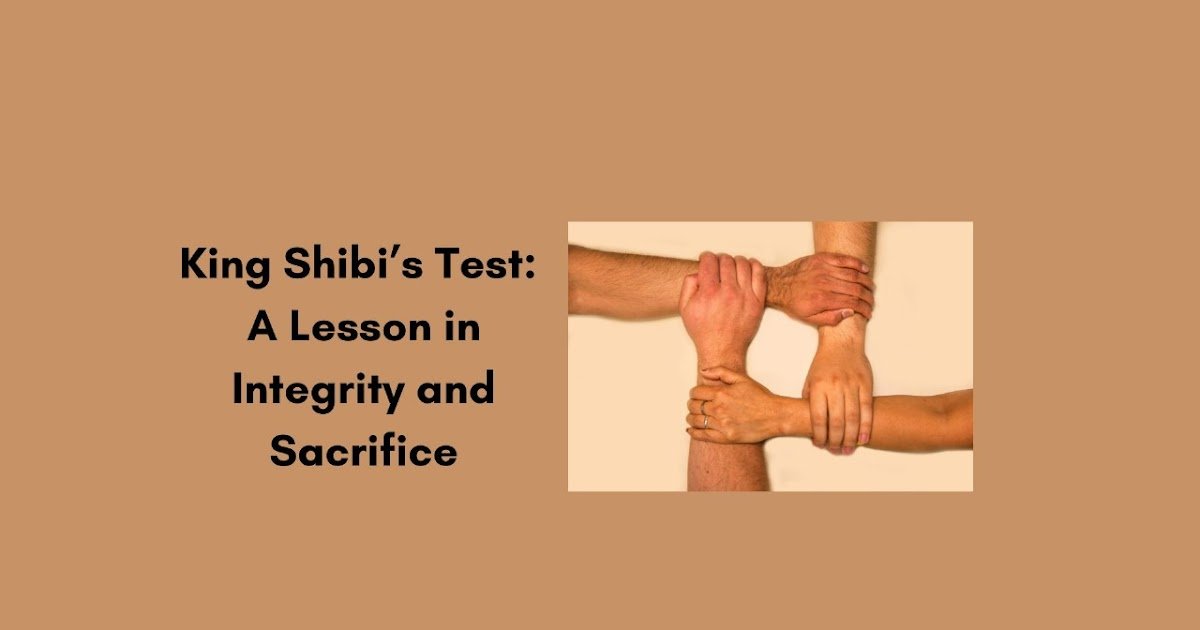Introduction
King Shibi, a distinguished monarch from the lunar lineage and a descendant of King Bharata, was esteemed for his steadfast dedication to honesty, fairness, and integrity. Renowned for his virtues, his reputation ascended to great heights—catching the attention of Dharmaraj, the Lord of Dharma, who decided to assess the extent of Shibi’s moral fortitude.
One day, while the king was on the terrace of his palace, a dove flew in distress toward him. Chased by a predatory eagle, the terrified bird sought refuge in the king’s lap, crying out, “O King, please shield me! Protect my life!”
Committed to his vow of providing safety to all who sought it, irrespective of their form or status, King Shibi tenderly held the dove and reassured, “Do not fear, beloved creature. You will be safe beneath my watch.”
A short while later, the eagle arrived before the king and insisted on taking back its prey. “O King,” it proclaimed, “you have sheltered the bird that is my rightful meal. Return it to me, so that I may survive.”
The king stood at a moral dilemma—should he save the defenseless dove or adhere to the natural cycle by allowing the eagle its due sustenance? To address this, the king suggested a compromise: he would provide the eagle an equal weight of meat from his royal kitchen. Yet, the eagle declined, insisting on the dove alone.
At last, the eagle presented a proposal. “Let the dove go,” it insisted, “and instead provide me with an equal weight of flesh from your own body.”
Without a moment’s hesitation, King Shibi concurred. He recognized this as a chance to fulfill his promise and to embody the principle of protecting the vulnerable.
Prior to carrying out his decision, the eagle imposed one last stipulation: “If a single tear escapes your eye during this act, I will withdraw my demand. A sacrifice made in sorrow cannot be genuine.”
Undaunted, the king called for his attendants. They brought forth a scale. The dove was placed on one side, and King Shibi ordered that a piece of flesh be taken from his own thigh and put on the other side.
To the amazement of all, irrespective of how much flesh was added, the scale carrying the dove remained heavier. Unfazed, the king kept giving—sacrificing more and more of himself.
Just as the final piece of his body was about to be placed on the scale, a tear formed in his left eye. The eagle interrupted, “You have failed, O King. This tear signifies your sorrow.”
But King Shibi smiled gently and replied, “No, noble bird. This is not a tear of regret or anguish. It is a tear of joy. My right side has been privileged to make a sacrifice. Now my left side rejoices in having the same honor. Why should only one side experience the honor of giving?”
In that instant, the eagle and the dove morphed before his eyes. They revealed themselves as Indra, the King of the Heavens, and Dharmaraj, the Lord of Righteousness. They had assumed these forms to evaluate the king’s integrity and selflessness.
Awestruck by the king’s nobility, the deities showered him with heavenly accolades, gifts, and blessings. King Shibi had successfully passed the ultimate test of dharma. He continued to rule with justice for many more years and, upon his passing, ascended to the heavens to enjoy the rewards of his virtuous actions.
Leading with Integrity and Empathy
The tale of King Shibi goes beyond merely teaching personal values; it offers vital lessons for contemporary leaders:
Integrity as the Foundation: Just as King Shibi did, genuine leaders must uphold their promises, even when faced with difficulties or adversity.
Empathy in Governance: Defending the “dove”—those who are vulnerable, marginalized, or unheard—should define modern leadership.
Fair Decision-Making: Weighing the interests of all stakeholders, as Shibi did with both the dove and the eagle, signifies inclusive and ethical leadership.
Purposeful Sacrifice: Exceptional leaders often forgo personal advantages for the common good, whether it means sacrificing time, resources, or comfort.
Finding Joy in Service: Similar to Shibi’s joyful tears, leaders driven by purpose seek satisfaction not through accumulation but through giving back.
In both business and life, King Shibi’s journey highlights that lasting respect is gained not through power, but by one’s character. When leaders display moral bravery, the effects resonate far beyond isolated actions or decisions.
The tale of King Shibi goes beyond merely teaching personal values; it offers vital lessons for contemporary leaders:

